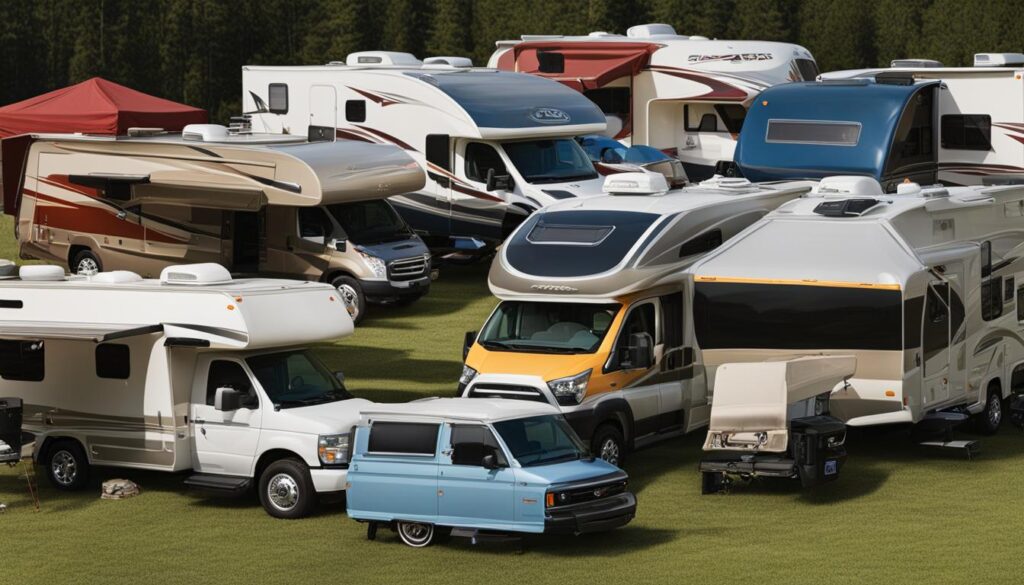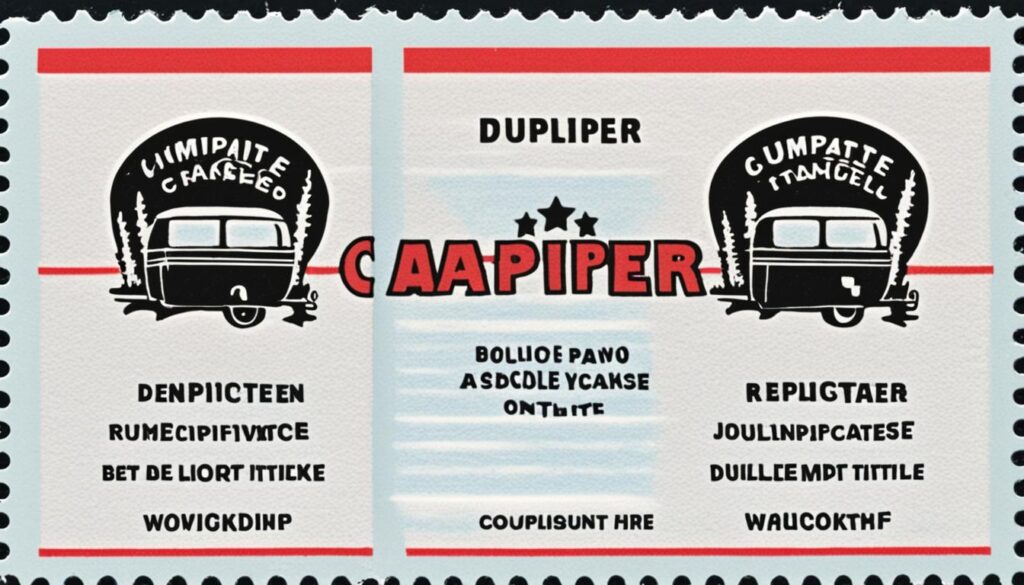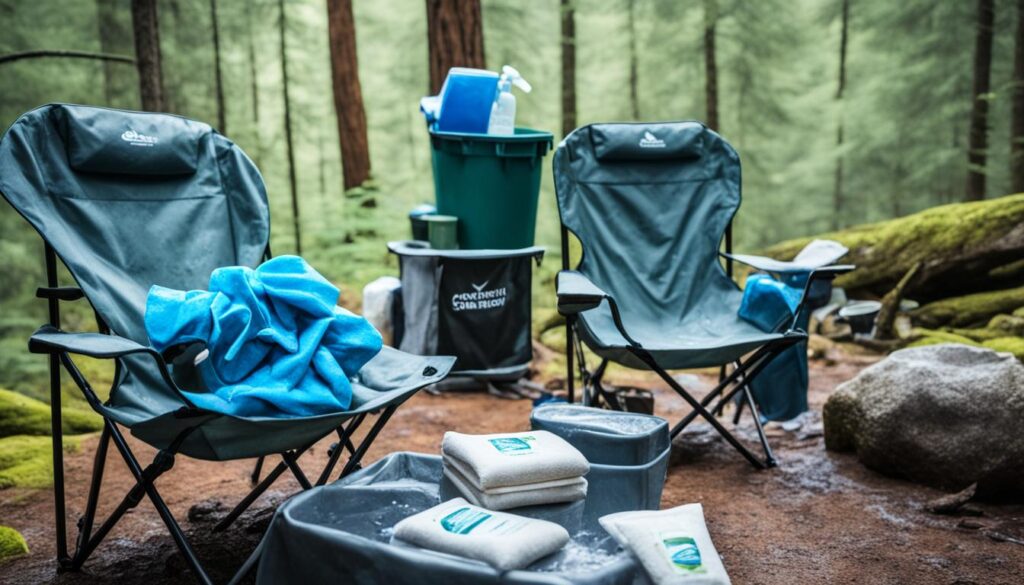Are you ready to embark on your next adventure with your new camper? Before you hit the road, there’s one important detail you can’t overlook: obtaining a title for your camper. A title not only establishes ownership but also serves as essential legal documentation. But how exactly do you go about getting a title for your camper? Let me guide you through the process step by step.
Knowing the ins and outs of obtaining a camper title is crucial to ensure a smooth transaction and avoid any potential headaches down the line. With proper documentation in hand, you can have peace of mind knowing that you have legally established ownership of your beloved camper. So, let’s dive into the details and explore how to get a title for a camper.
Key Takeaways:
- Obtaining a title for a camper is crucial for establishing ownership and legal documentation.
- A title serves as official proof of ownership and is required for most motor vehicles, including campers.
- To obtain a camper title, you need to meet specific criteria set by your state’s Department of Motor Vehicles (DMV).
- Applying for a camper title involves completing an application form and submitting it along with the necessary fees and documentation to the DMV.
- If you only need a title for your camper without registering it, you can opt for a title-only transaction.
Contents
What is a Title and Which Vehicles Need to be Titled?
A title is a Certificate of Title (MV-999) that serves as official proof of ownership for various vehicles, including campers. In order to obtain a title for a camper, it must meet certain criteria. For example, in New York State, a title is issued for motor vehicles of model year 1973 or newer, motorboats of model year 1987 or newer that are 14 feet or longer, and manufactured homes of model year 1995 or newer that meet specific size requirements. It is important to check the specific requirements for camper titles in your state.
To give you a better understanding, here is a breakdown of the title requirements for different types of vehicles in New York State:
| Vehicle Type | Title Requirement |
|---|---|
| Motor Vehicles (Model Year 1973 or Newer) | Title Required |
| Motorboats (14 Feet or Longer, Model Year 1987 or Newer) | Title Required |
| Manufactured Homes (Model Year 1995 or Newer) | Title Required |
These are just examples of title requirements in New York State. Each state may have different laws and regulations regarding camper titles. It is crucial to familiarize yourself with the camper title laws and requirements in your specific state to ensure compliance.
“A title is a vital document that establishes ownership and legal documentation for campers and other vehicles.”
Understanding the title requirements for campers is essential when it comes to buying, selling, or registering a camper. By following the proper procedures and providing the necessary camper title documents, you can ensure a smooth and legal transaction.

How to Apply for a Camper Title
Applying for a camper title is an essential step in establishing legal ownership and documentation for your camper. To ensure a smooth process, it’s important to understand the necessary steps for a camper title application. Here’s a detailed guide on how to apply for a camper title:
- Gather Required Documentation: Before submitting a camper title application, you’ll need to gather the necessary documentation. This typically includes proof of ownership, such as a manufacturer’s certificate of origin or a transferred certificate of title. Make sure to carefully review your state’s specific requirements for camper title applications.
- Complete the Application Form: The next step is to fill out the Vehicle Registration/Title Application (MV-82) form. This form is available through your state’s Department of Motor Vehicles (DMV) website or in person at a DMV office. Provide accurate and complete information on the form to avoid any delays in processing your application.
- Submit the Application: Once you’ve completed the application form, you’ll need to submit it along with the required fees and documentation to your state’s DMV. The fees may vary depending on your location, so check the DMV website or contact them directly for the exact amount.
- Wait for Processing: After submitting your camper title application, you’ll need to wait for it to be processed by the DMV. The processing time can vary, so it’s important to be patient. During this time, it’s a good idea to keep track of your application status, whether through online tracking systems or by contacting the DMV directly.
- Receive Your Camper Title: Once your application is approved, you will receive your camper title in the mail. This document serves as official proof of ownership for your camper and should be kept in a safe place.
Remember, the process for applying for a camper title may vary depending on your state’s specific requirements. It’s essential to follow the application steps outlined by your state’s DMV to ensure a successful application. If you have any questions or need further clarification, don’t hesitate to reach out to your local DMV office for assistance.
| Steps to Apply for a Camper Title | Details |
|---|---|
| Gather Required Documentation | Proof of ownership (manufacturer’s certificate of origin or transferred certificate of title) |
| Complete the Application Form | Vehicle Registration/Title Application (MV-82) form |
| Submit the Application | Along with fees and documentation to your state’s DMV |
| Wait for Processing | Processing time varies |
| Receive Your Camper Title | Official proof of ownership sent via mail |
Title Only Transactions and Duplicate Titles
In some cases, a camper owner may only need a title without registering the camper. This is known as a title only transaction. To initiate a title only transaction, you will need to complete the Vehicle Registration/Title Application (MV-82) form. This form can be obtained from your state’s Department of Motor Vehicles (DMV) website or office.
Once you have the form, fill it out with accurate and up-to-date information. Make sure to provide the necessary documentation, such as proof of ownership and the required sales tax payment. This will help process your title only transaction smoothly.
Completing the Vehicle Registration/Title Application (MV-82) Form
The MV-82 form typically requires the following information:
- Your personal details, including your name, address, and contact information.
- The vehicle information, such as the make, model, year, and vehicle identification number (VIN).
- The reason for the title only transaction, which should be specified clearly.
- Proof of ownership, such as a manufacturer’s certificate of origin or a transferred certificate of title.
- The required sales tax payment. The amount may vary depending on your state and the value of the camper.
Once you have completed the form and gathered all the necessary documentation, submit them to your state’s DMV along with the required fees. The DMV will review your application and process your request for a title only transaction.
Additionally, if your camper title is lost, stolen, or damaged, you can obtain a duplicate title. To do so, complete the Application for Duplicate Certificate of Title (MV-902) form, which can be obtained from the DMV’s website or office. Submit the completed form, provide any additional required documentation, and pay the prescribed fees to obtain a duplicate title.
Benefits of Title Only Transactions and Duplicate Titles
There are several benefits to opting for a title only transaction or obtaining a duplicate title:
“Title only transactions provide an efficient way for camper owners to legally establish ownership without the need for registration. This can be especially convenient for campers that are primarily used on private property or for off-road adventures. On the other hand, obtaining a duplicate title ensures that owners maintain proof of ownership in case the original title is lost, stolen, or damaged. Both processes help safeguard camper owners’ interests and simplify documentation requirements.”
By following the appropriate procedures and fulfilling the necessary requirements, you can successfully complete a title only transaction or acquire a duplicate title for your camper.

Additional Considerations for Trailer Titles
When it comes to obtaining a title for a trailer, including camper trailers, there are important factors to consider. One such consideration is the requirement for annual safety inspections. Depending on your state’s laws, trailers may need to undergo these inspections to ensure they meet the necessary safety standards. This is particularly important for trailers that are regularly towed on public roads.
In addition, it’s worth noting that certain types of trailers may not require registration. This means that while you may not need a title for these trailers, it’s still essential to understand the specific laws and regulations governing the registration and titling process. These may vary depending on the type of trailer and the state you reside in.
It is crucial to consult your state’s Department of Motor Vehicles (DMV) or relevant authorities to fully understand and comply with the trailer title requirements. They can provide you with accurate information regarding the trailer title process, any applicable laws, and necessary inspections. Being well-informed can help ensure a smooth and legal transaction when obtaining a title for your trailer.
FAQ
How do I obtain a title for my camper?
To obtain a title for your camper, you will need to meet certain criteria and follow your state’s specific process for obtaining a camper title. This typically involves completing a Vehicle Registration/Title Application form and submitting it to the Department of Motor Vehicles (DMV) along with the necessary fees and documentation. It is important to check the requirements and steps outlined by your state’s DMV for the camper title process.
What is a title and which vehicles need to be titled?
A title is a Certificate of Title that serves as official proof of ownership for various vehicles, including campers. In most states, motor vehicles of a certain model year or newer, motorboats of a certain model year or newer that are a specific length, and manufactured homes of a certain model year or newer that meet specific size requirements, are required to have a title. The specific requirements for camper titles may vary by state, so it is important to check with your state’s DMV for the applicable laws and regulations.
How do I apply for a camper title?
The process for applying for a camper title typically involves completing a Vehicle Registration/Title Application form and submitting it to the Department of Motor Vehicles (DMV) along with the required documentation and fees. This may include providing proof of ownership, such as a manufacturer’s certificate of origin or a transferred certificate of title. It is important to follow the specific application steps outlined by your state’s DMV to ensure a successful camper title application.
Can I get a title for my camper without registering it?
Yes, it is possible to obtain a title for your camper without registering it. This is known as a title only transaction. To complete a title only transaction, you will need to fill out the appropriate form, such as the Vehicle Registration/Title Application, and provide documentation such as proof of ownership and payment of any applicable sales tax.
What should I do if my camper title is lost, stolen, or damaged?
If your camper title is lost, stolen, or damaged, you can obtain a duplicate title by completing an Application for Duplicate Certificate of Title and paying the required fees. The specific process and fees may vary by state, so it is advisable to contact your state’s DMV for guidance on obtaining a duplicate camper title.
Are there any additional considerations for obtaining a title for a camper trailer?
Yes, there may be additional considerations for obtaining a title for a camper trailer. Some states require trailers, including camper trailers, to undergo annual safety inspections. Additionally, certain types of trailers may not require registration. It is important to consult your state’s DMV or relevant authorities to understand and comply with the specific requirements and regulations for obtaining a title for a camper trailer.






